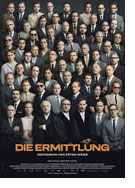

Opening 25 Jul 2024
Directed by:
RP Kahl
Writing credits:
Peter Weiss
Principal actors:
Tom Wlaschiha, Christiane Paul, Andreas Pietschmann, Clemens Schick, Rainer Bock
It’s the mid-1960s and we are in a court room. The judge (Rainer Bock) sits in the middle of the room, among members of the jury. To the left are eighteen defendants who are being accused of sending innocent people to the Auschwitz Gas Chambers during World War II, 1941-43. Thirty-nine witnesses appear before the judge to describe their experiences concerning either having sent others or being sent themselves to Auschwitz. This evidence should prove the defendants guilty. Two or three witnesses, the majority male, stand side by side and each one speaks for about five minutes. Then they turn, leave the room and new witnesses come in. They recognize and point at the accused to identify them, calling them by name; many are medical doctors who examined the subjects before sending them to the gas chamber. The witnesses refer to receiving injections of phenol, suffering from hunger, being gassed with Zyklon B, and watching children being killed. The accused were killing their own people, and keeping their jewelry, and even their teeth and hair. Occasionally an accused will attempt to defend himself saying “That was a command; we had no choice.”
Amazingly, this film is so good that one can easily watch it for four hours, always in just one court room. The witnesses are well dressed in suits, ties, the women in high heels. The film is based on the play Die Ermittlung: Oratorium in 11 Gesängen by Peter Weis. The German word “Gesängen” means “songs” although there is very little music, which first comes up sixty minutes into the film for just thirty seconds. Die Ermittlung is based on personal information, newspaper articles, and transcripts from the first Frankfurt Auschwitz court cases held in 1963-1965. The film is divided into eleven “chapters,” and each has a title such as “Song 2 from the Camp” or “Song 5 about the end of Lili Tofler” or “Song 11 Fire Oven.” At the end of the film, we see original photos of the Auschwitz-Birkenau gas chambers. (Becky Tan)